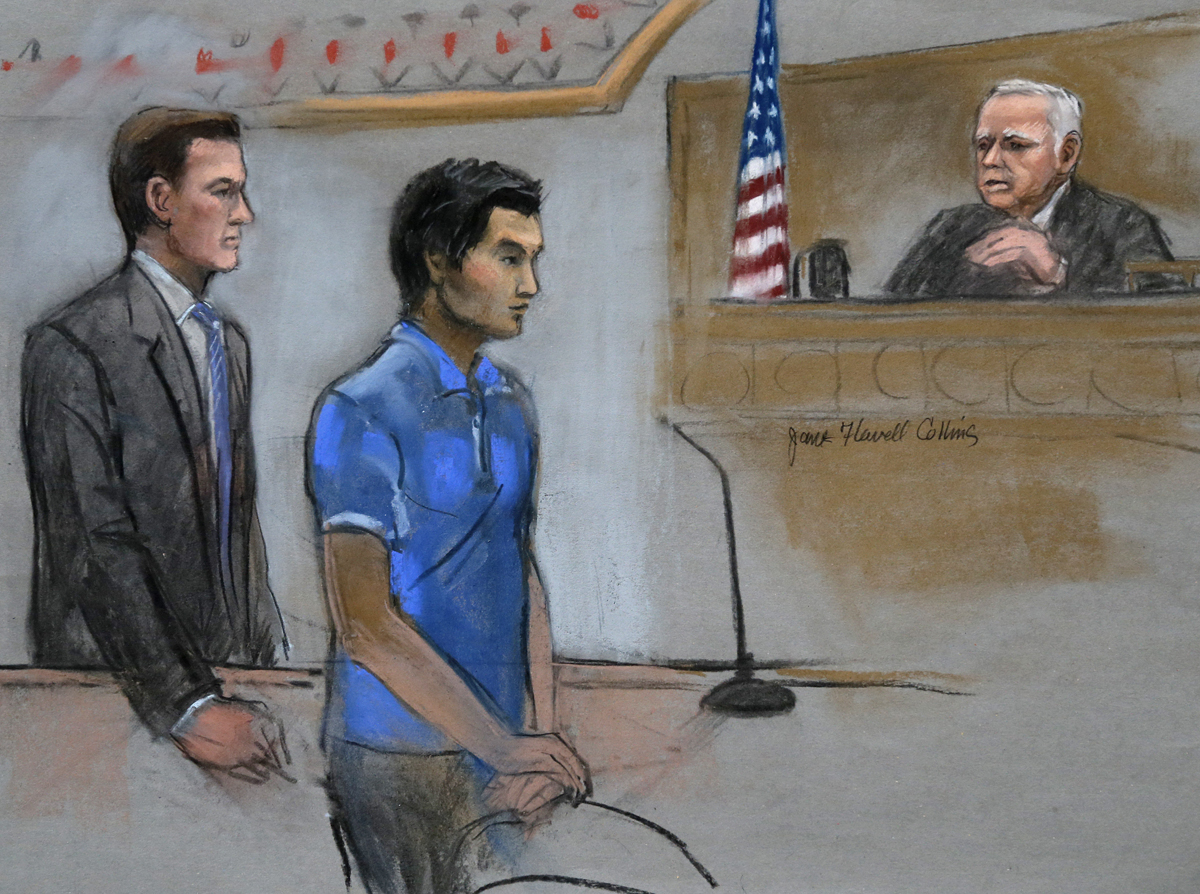Dzhokhar Tsarnaev’s College Friend Pleads Guilty

Sketch via AP
In a major turnaround, Dzhokhar Tsarnaev’s college friend Dias Kadyrbayev pleaded guilty to charges he obstructed the investigation into the Boston Marathon bombings in a court hearing on Thursday.
Wearing a blue shirt and jeans, 20-year-old Kadyrbayev admitted he knew Tsarnaev was a bombing suspect when he went into Tsarnaev’s UMass Dartmouth dorm room and took his laptop and a backpack containing fireworks, Vaseline, and a thumb drive, and then threw the backpack into a dumpster. His guilty plea is the result of an agreement worked out between prosecutors and the defense, whereby Kadyrbayev will only serve a maximum of seven years instead of the potential 25 if found guilty. Judge Douglas Woodlock must still approve the plea agreement for the deal to move forward.
The prosecution said it took 25 agents two days to search through a landfill to find the backpack, and once they did, the items and the backpack had been altered.
“Is it all true?” Woodlock asked.
“Yes,” said Kadyrbayev, with his head down.
He stood solemnly when entering his guilty plea, a shift from his typically jovial mood—he started the hearing by flashing his attorney Robert Stahl a toothy grin. Despite the serious nature of his charges, Kadyrbayev comes off as a bit of a class clown. He has already taken the stand in attempt to suppress statements he made to the FBI on the grounds that he did not understand his Miranda rights. Expert witnesses argued that his reliance on slang masked his inability to comprehend complex phrases. Back in June, his first word to the court was, “Sup?”
Stahl later told reporters that Kadyrbayev has spent the past year alone in his cell, reflecting on his actions. “He understands he should not have gone to that room,” he said. “He did not do so out of malice.” None of the Tsarnaev’s friends facing charges are accused of knowing about the bombing beforehand.
Kadyrbayev’s plea is just the latest in a series of legal happenings stemming from Tsarnaevs associates, coming just a month after his friend and co-conspirator Azamat Tazhayakov was found guilty of obstruction after agreeing with Kadyrbayev to remove and throw out Tsarnaev’s backpack. He could face up to 25 years.
Tazhayakov and Kadyrbayev are both from Kazakhstan. They became friends with Tsarnaev in 2011 during their first semester at UMass because they all spoke Russian and, according to friends’ testimonies, bonded over an interest in video games and weed. In an opening statement, Myers argued that they originally went to Tsarnaev’s room get his marijuana.
Missing from the courtroom yesterday was Robel Phillipos, another friend of Tsarnaev’s who allegedly was in the dorm room when Kadyrbayev and Tazhayakov took the backpack. Phillipos is not facing charges of obstructing justice but is facing one count of lying to the FBI. His trial is set for next month.
Phillipos grew up in the same Cambridge apartment complex as Stephen Silva, who was arrested last month for selling heroin and for possessing a firearm with an obliterated serial number in February 2013. The Ruger model P95 is believed to be the same gun the Tsarnaevs allegedly used to shoot and kill MIT officer Sean Collier.
“He basically let him use it but having no idea what he was going to do with it, and next thing you know, he’s a terrorist,” said a friend of Silva’s who asked not to be named.
Silva was friends with Dzhokhar and has an identical twin Steven Silva, who was reportedly even closer to the Tsarnaevs. Stephen Silva was arrested in November 2013 and told law enforcement, “I smoke weed because my friend is the bomber.” Silva’s friends tell Boston magazine Silva grew increasingly depressed after the bombing. His next court hearing is set for October.
Two additional Tsarnaev friends, Khairullozhon Matanov and Konstantin Morozov, were detained in separate incidents on May 30 of this year. Matanov is charged with three counts of lying to federal authorities and two counts of obstructing justice. His trial is set for June 2015.
Morozov was detained on immigration charges. His attorney Carlos Estrada says Morozov was applying for asylum and was detained after FBI agents asked him to become an informant. Morozov refused.
Tsarnaev’s capital case is set to start in November. The emerging theme from the testimony and documents of Tsarnaev’s associates’ cases is the younger Tsarnaev’s cool demeanor in the days after the bombings. In a video released in Tazhayakov’s trial, Tsarnaev appears to smile nonchalantly on the way to the gym, just a day after the bombings.


